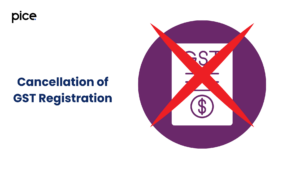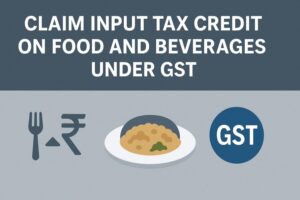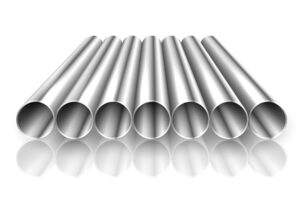All About Impact of GST on Chemical Industry
- 19 Jun 25
- 9 mins
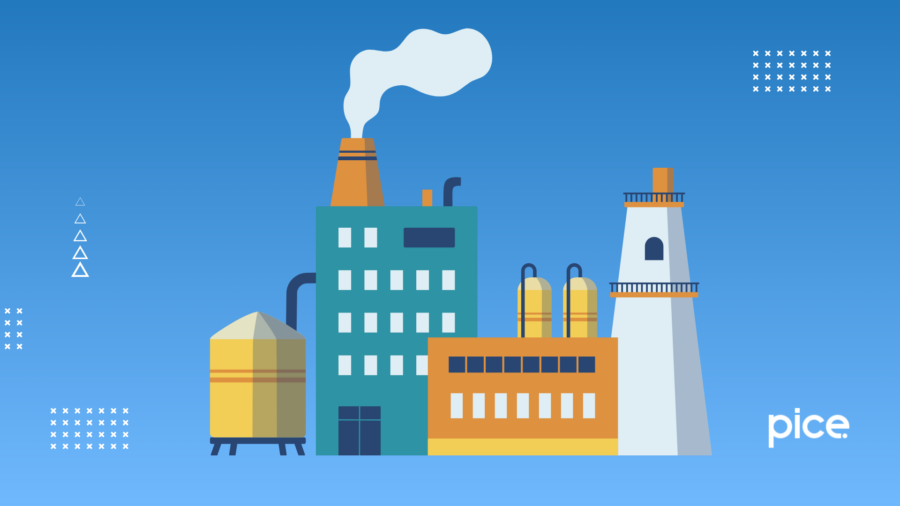
All About Impact of GST on Chemical Industry
Key Takeaways
- GST simplifies taxation in the chemical industry by using HSN codes to classify goods and ensure accurate tax application.
- Different GST slabs (0%, 5%, 12%, 18%) apply to chemical and medical products depending on their use, type, and classification.
- Accurate GST calculation is crucial for manufacturers to claim Input Tax Credit (ITC) and manage inter-state transactions effectively.
- Understanding product-specific GST rates enhances pricing strategies and ensures compliance with India’s tax regulations.
- Precision in GST computation builds business credibility, strengthens fiscal discipline, and supports sustainable growth.
Those involved in the taxation domain must be aware of the Goods and Services Tax (GST) rates of chemical products. This particular industry significantly contributes to India’s economic growth and covers a wide range of products and services.
This blog aims to uncover the impact of GST on the chemical industry by offering a comprehensive guide that taxpayers and business owners can rely on. If you are a manufacturer, consider going through the individual segments as it will assist you in managing the complications of inter-state transactions.
What is GST?
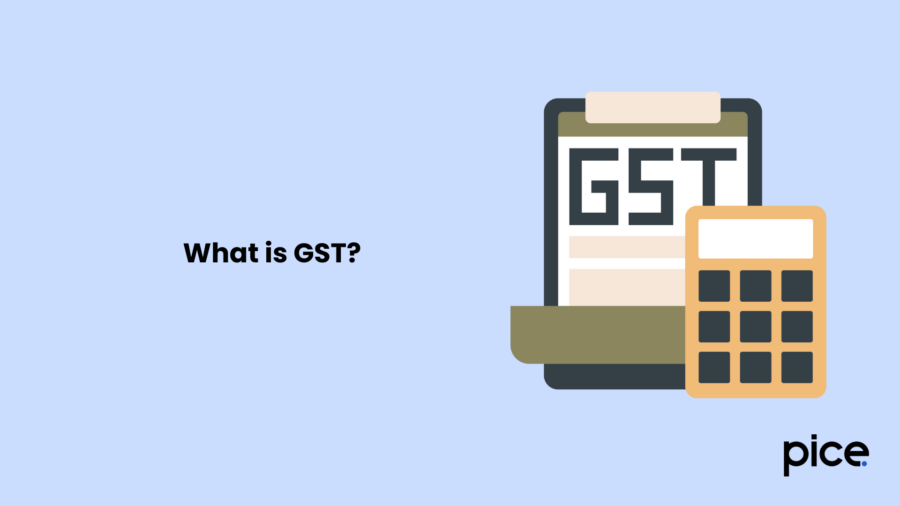
Understanding the new financial and taxation concepts can be overwhelming and at the core of this framework lies GST.
The Goods and Services Tax is a consumption-based tax system that has completely changed the way businesses approach tax liabilities. It works on the provision of value addition, making sure that the authorities collect tax at every stage of the supply chain. This ensures a fair distribution of the tax burden.
How Do I Calculate GST?
As a taxpayer, you can implement the below-mentioned formula to determine GST:
Step 1: Add GST
Step 2: GST amount = (Original price of the supply * GST%) / 100
Step 3: Net price = Initial cost + GST amount
Step 4: Remove the GST part
Step 5: GST amount = Original cost - (Original cost * (100 / (100 + GST%)))
Step 6: Net price = Original price =- GST amount
GST for Chemical Products
Understanding the application of GST in chemical products is much similar to grasping a complicated molecular structure. It demands skills to understand the basics of GST for chemicals. GST for chemical items revolve around various classifications which are declared in the form of an elaborate tax code.
The issues emerge mainly due to the complex nature of the chemical sector. It is an industrial space where evolution and innovation are constant companions. Accountants perceive GST on chemical products as more than regular taxation because it requires precise explanations and clarity. Just as chemical molecules interact within a reaction, the related GST components similarly interact to maintain fiscal equilibrium.
Under GST, Chemical Products are Classified Using HSN
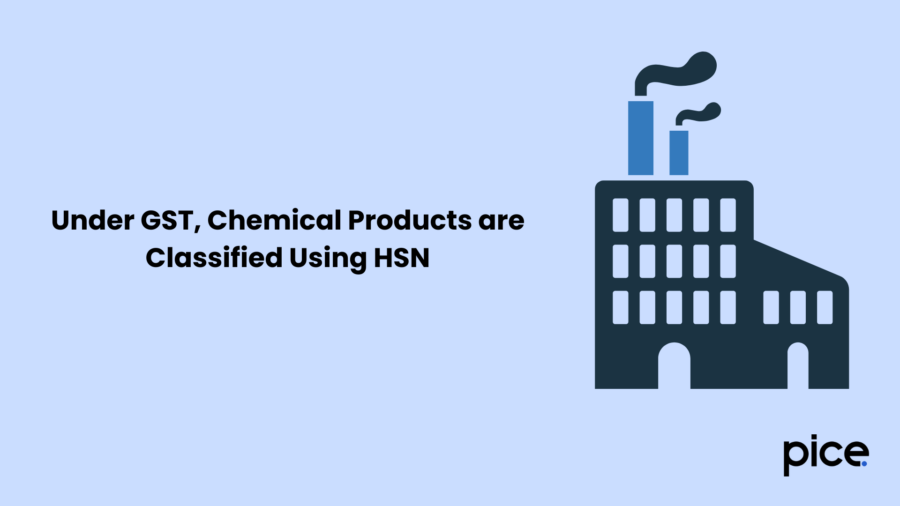
The Harmonised System of Nomenclature (HSN) is a globally recognised system used for classifying goods, including chemical products, under India's Goods and Services Tax. Chemical products are categorised systematically under specific chapters, headings and subheadings to ensure uniformity in taxation and facilitate international trade.
Below is a table summarising the classification of chemical products under HSN codes:
| Category of the Product | HSN Code Range | Description |
|---|---|---|
| Inorganic chemicals | 2801-2829 | Includes compounds of precious metals, rare-earth metals, radioactive elements. |
| Organic chemicals | 2901-2942 | Covers hydrocarbons, alcohols, acids, and other organic compounds. |
| Pharmaceuticals | 3001-3006 | Bulk drugs, formulations, and medicinal products. |
| Fertilisers | 3101-3105 | Agrochemicals such as nitrogenous and phosphatic fertilisers. |
| Dyes and pigments | 3204-3207 | Includes colouring matter, paints, and varnishes. |
| Essential oils and perfumes | 3301-3307 | Essential oils, cosmetics, and toilet preparations. |
| Rubber and its byproducts | 4001-4017 | Natural rubber and synthetic rubber derivatives. |
| Inks, paints and varnishes | 3208-3210 | Includes mastics and inks. |
| Fireworks and explosives | 3601-3606 | Pyrotechnic products such as explosives and fireworks. |
This classification ensures efficient application of GST rates while simplifying customs procedures for importers and exporters.
Chemical Products and Their Respective GST
To get a fair idea about the impact of GST on the chemical industry, read the sections provided below:
- Nil GST Applicable on Specific Medicines and Medical Goods
Under this category, falls the below-mentioned supplies:
- Human blood and its subsequent byproducts used for making medicines
- Any sort of contraceptive
- Tampons or sanitary napkins
- 5% GST Rate on Medicines and Medical Items
Some medical products that attract 5% GST are listed below:
- Insulin
- Animal or human blood vaccines
- Diagnostic kits for detecting hepatitis
- Oral rehydration salts
- Cyclosporin
- Medicaments necessary for biochemical systems (not displaying any brand name)
- Artificial kidneys
- Formulations designed from bulk drugs as mentioned in List 2 of the notification 12/2012 published by the central excise like Quinine, Hydrocortisone, Streptomycin, amongst 20+ other drugs
- Medicines and diagnostics test kits mentioned in List 1 of the central excise notification 12/2012 like Protamine, Influenza vaccine, Dopamine, amongst 200+ other drugs
- Artificial limbs
- Coronary stents
- Ostomy appliances
- Milk food items for babies
- COVID-19 diagnostic test kits
Note: The list is exhaustive as other related chemical items can be included.
- 12% GST on Medical Goods
A wide variety of chemical products are subject to a 12% GST rate. Here, you can refer to some of those items:
- Animal blood for diagnostic uses, therapeutic or prophylactic purposes
- Modified immunological products, antisera and other blood fractions
- Toxins, microorganism-derived cultures (like yeasts) and other similar items
- Bandages, gauze, wadding, and similar products, or items coated with pharmaceutical substances for retail usage
- Tooth powder
- Enzymes and prepared enzymes
- Glucometer (blood glucose monitoring systems) along with test strips
- Diabetic supplements
- Drugs for personal use
- Surgical rubber gloves, etc.
Note: The list is exhaustive as other related chemical items can be included.
- 18% GST Rate on Specific Medicines and Medical Goods
In the pointers below, you can find some medical products on which GST authorities levy a flat 18% tax:
- Oral products having nicotine that are made to restrict tobacco usage
- Pharmaceutical or hygienic products like hot water bottles, teats, ice bags, etc.
- Preparations made for dental hygiene and floss that are sold in separate retail packages
- Medical, surgical, dental or veterinary furniture like examination tables, operating tables, hospital beds, etc.
- Razors and razor blades
- Infrared thermometers, barometers, hygrometers, psychrometers, and pyrometers
- Organic surface-active chemical products or preparations for washing your skin (may or may not contain soap)
- 28% GST Rate on Specific Medicines and Medical Goods
In India, no pharmaceutical products are currently taxed at 28% GST. To further check the details, you can use an online HSN code finder where the GST rates are given against respective supplies.
Why is it Important to Calculate GST on Chemical Products?
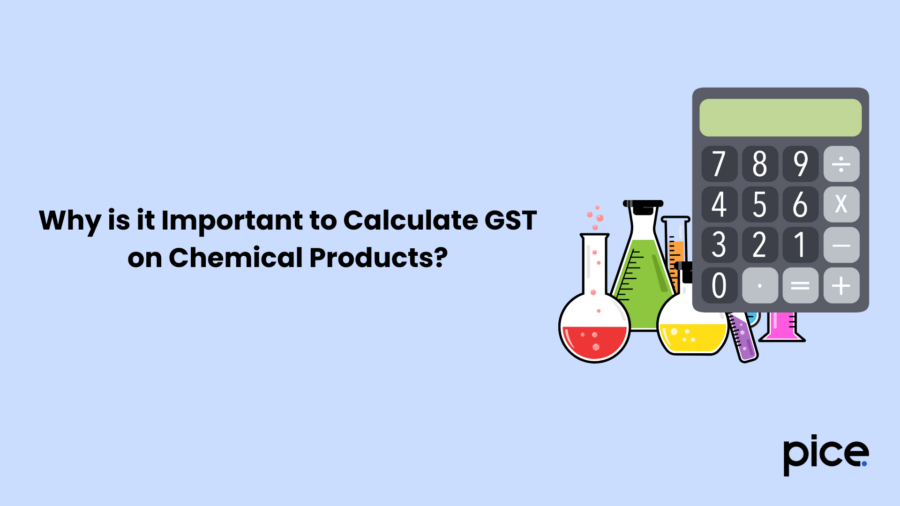
The correct determination of GST liability on chemical items proves vital to meeting tax laws while promoting transparency and preventing legal consequences. The chemical industry depends on exact GST calculations because it needs to fulfil the requirements of Harmonised System of Nomenclature (HSN) codes and related tax rates.
Effective GST calculation serves both ethical business interests and financial planning by helping companies optimise resource management and pricing models. The correct execution of GST computations helps businesses obtain input tax credits more efficiently which leads to decreased tax responsibilities and stronger market competition. Sustainable growth along with industry reputation becomes attainable through this system.
The Role of Precision in GST Calculation for Chemical Products
The exact calculation of GST rates for chemical products becomes essential because the industry possesses intricate tax category systems. GST calculations that are precise enable businesses to meet regulatory requirements while reducing risk exposure as well as establishing trust with stakeholders.
As already discussed, the chemical industry uses HSN codes for classification purposes while considering both the application and composition elements. Businesses that perform precise GST calculations can improve their input tax credit claims and execute effective pricing strategies for competitive market performance.
The chemical industry must prioritise precise GST calculations since they serve as both a survival necessity and a competitive tool in its market-driven environment.
Conclusion
In conclusion, the impact of GST on the chemical industry is profound, reshaping taxation frameworks and operational strategies. The chemical industry relies on HSN codes to classify medicinal purposes while maintaining both purity and composition elements. Businesses that stick to accurate GST calculations can enhance their ITC claims and exercise practical pricing for better market performance.
💡If you want to streamline your invoices and make payments via credit or debit card or UPI, consider using the PICE App. Explore the PICE App today and take your business to new heights.
FAQs
What is GST and how does it impact the chemical industry?
Why is HSN code classification important for chemical products?
How can I calculate GST for a chemical product?
GST Amount = (Original Price × GST%) / 100
Net Price = Original Price + GST Amount
To reverse-calculate, subtract the GST part using:
GST Amount = Original Price - [Original Price × (100 / (100 + GST%))]
This ensures transparent pricing and accurate tax reporting.
What GST rates apply to different types of chemical goods?
0% to 5% for essential medicines and blood products
12% for diagnostic reagents, bandages, and medical rubber items
18% for hygiene preparations, dental items, and surgical furniture
No chemical product in the medical category is taxed at 28% currently
Rates depend on HSN codes and government notifications.
 By
By 





